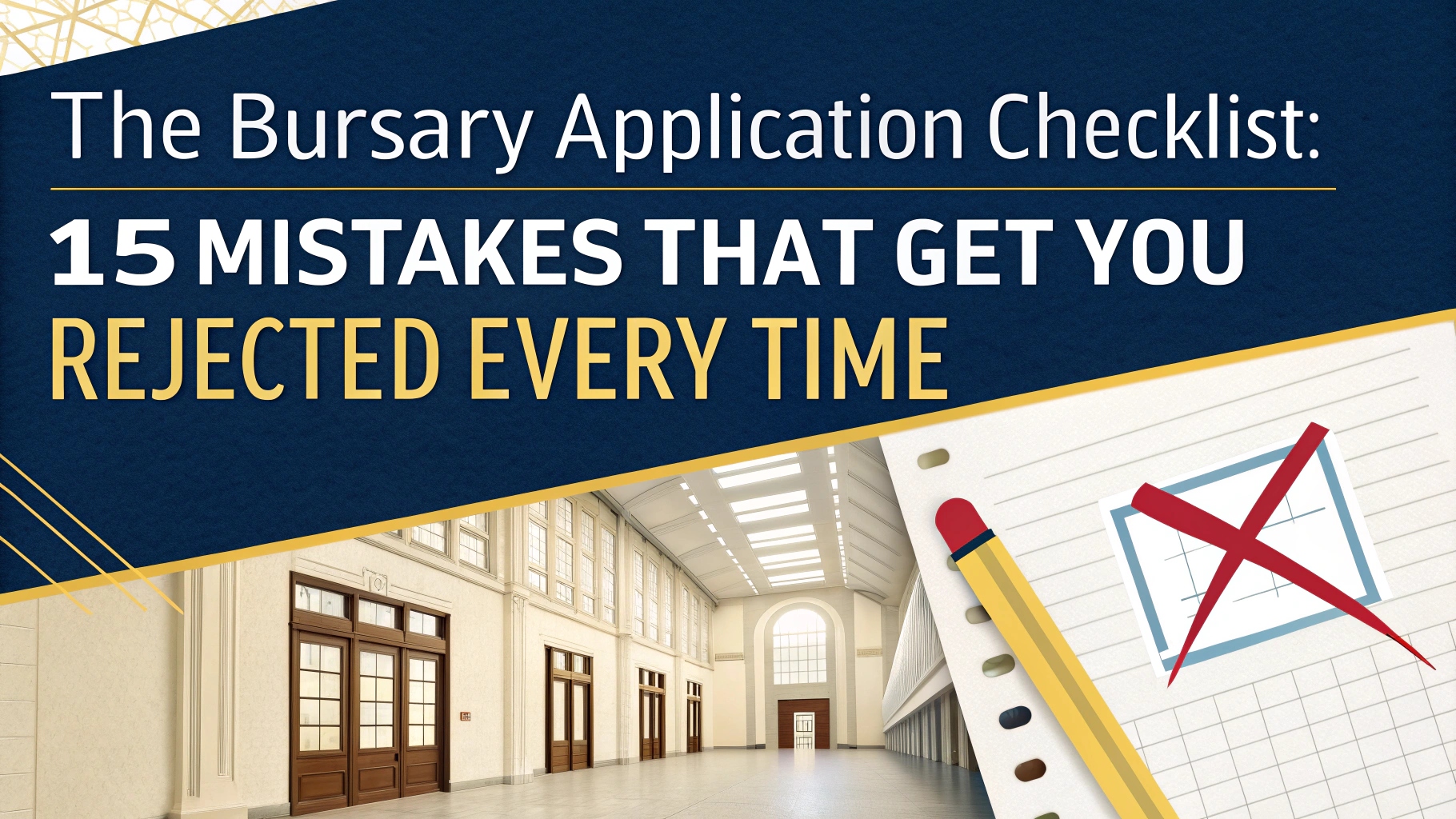The Bursary Application Checklist: 15 Mistakes That Get You Rejected Every Time

Getting a bursary can change your life. It’s often the difference between pursuing your dreams and putting them on hold. But every year, thousands of students in South Africa apply for bursaries — and only a fraction get selected. Why? In many cases, it’s not about grades or background; it’s about mistakes in the application process.
To help you stand out and succeed, we’ve compiled a detailed checklist of 15 common bursary application mistakes that can get you rejected — and how to avoid each one.
1. Missing the Deadline
This is the most common and the most avoidable mistake. Bursary providers are strict about deadlines. Even if you’re the perfect candidate, your application will be rejected if it’s late.
Tip: Create a calendar with all your bursary deadlines and set reminders at least a week before.
2. Submitting Incomplete Applications
Leaving out even one required document — like your ID copy, proof of income, or school reports — can lead to automatic disqualification.
Tip: Always use the application checklist provided and double-check your submission before sending.
3. Poorly Written Motivation Letter
A weak or generic motivation letter shows lack of effort. This letter is your chance to stand out, so make it personal, compelling, and sincere.
Tip: Focus on your goals, your financial need, and how the bursary will help you make a difference.
4. Applying for the Wrong Bursary
Some students apply for bursaries that don’t match their field of study or career plans. If you don’t meet the criteria, your application won’t be considered.
Tip: Always read the eligibility requirements carefully before applying.
5. Failing to Provide Proof of Financial Need
Many bursaries are need-based. If you don’t include proof of household income or an affidavit (if unemployed), your application may be rejected.
Tip: Include payslips, bank statements, or affidavits from a police station to support your financial need.
6. Submitting Uncertified Documents
Uncertified or outdated documents (older than 3 months) are often not accepted by bursary panels.
Tip: Visit your nearest police station or post office to certify all necessary documents before submitting.
7. Using an Unprofessional Email Address
Your email address is often the first thing a reviewer sees. Using something like cutegirl123@xyz.com doesn’t leave a great impression.
Tip: Use a professional email format like firstname.lastname@gmail.com.
8. Ignoring Application Instructions
Each bursary provider may require different submission methods (email, online portal, or postal mail) or file formats (PDF, Word, etc.). Failing to follow these instructions can get you disqualified.
Tip: Read all instructions carefully and follow them exactly.
9. Applying for One Bursary Only
Many students apply for just one or two bursaries and hope for the best. That’s risky, especially with high competition.
Tip: Apply for multiple bursaries that match your qualifications and interests.
10. Handwriting Illegibly
If you're submitting a paper application and your handwriting is messy, it can be hard for reviewers to read your information.
Tip: Use block letters or, if possible, complete your application electronically.
11. Lack of Academic Consistency
If your academic records show major drops without explanation, bursary panels might question your reliability.
Tip: If you’ve had personal challenges (illness, family issues), mention them in your motivation letter to explain any academic inconsistencies.
12. Not Getting Recommendations
Many bursaries require a reference letter from a teacher, lecturer, or community leader. Not including this can weaken your application.
Tip: Ask for recommendation letters early. Choose someone who knows you well and can vouch for your work ethic and character.
13. Not Following Up
Some students submit applications and forget about them. But mistakes or missing documents might need urgent follow-up.
Tip: Keep copies of everything you submit and follow up a week or two after the deadline to confirm receipt.
14. Lying or Exaggerating
Providing false information — about your household income, academic performance, or achievements — can lead to disqualification or blacklisting.
Tip: Always be honest. Bursary panels verify your information.
15. Not Practicing for Interviews
Some bursary programs include interviews. If you’re shortlisted and unprepared, it could cost you the opportunity.
Tip: Practice answering common interview questions about your career goals, financial need, and why you chose your field of study.
Bonus: The Perfect Bursary Application Checklist
Before hitting "send" or posting your application, make sure you’ve ticked off all of the following:
You meet all eligibility criteria
All required documents are included and certified
Your academic results are attached
Your motivation letter is personal and well-written
You used a professional email address
You followed all submission instructions
You applied before the deadline
You saved copies of all submitted materials
You applied for more than one bursary
You followed up to confirm submission
Final Thoughts
Getting a bursary is not just about being smart — it’s about being prepared. Avoiding these 15 common mistakes could be the difference between rejection and acceptance. The more careful and strategic you are with your application, the better your chances of securing the financial support you need to study stress-free.
Remember, competition is tough, but with the right approach, you can give yourself a real advantage. Start early, stay organized, and don’t be afraid to apply for multiple opportunities.